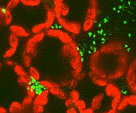Plant Pathology, Department of

Department of Plant Pathology: Faculty Publications
Document Type
Article
Date of this Version
2005
Abstract
The role of reactive oxygen species (ROS) in cell communication, control of gene expression, and oxygen sensing is well established. Inappropriate regulation of ROS levels can damage cells, resulting in a diseased state. In Colletotrichum trifolii, a fungal pathogen of alfalfa, the mutationally activated oncogenic fungal Ras (DARas) elevates levels of ROS, causing abnormal fungal growth and development and eventual apoptotic-like cell death but only when grown under nutrient-limiting conditions. Remarkably, restoration to the wild-type phenotype requires only proline. Here, we describe a generally unrecognized function of proline: its ability to function as a potent antioxidant and inhibitor of programmed cell death. Addition of proline to DARas mutant cells effectively quenched ROS levels and prevented cell death. Treating cells with inhibitors of ROS production yielded similar results. In addition, proline protected wild-type C. trifolii cells against various lethal stresses, including UV light, salt, heat, and hydrogen peroxide. These observations appear to be general because proline also protected yeast cells from lethal levels of the ROS-generating herbicide methyl viologen (paraquat), suggesting a common protective role for proline in response to oxidative stress. The ability of proline to scavenge intracellular ROS and inhibit ROS-mediated apoptosis may be an important and broad-based function of this amino acid in responding to cellular stress, in addition to its well established role as an osmolyte.


Comments
Published in PNAS March 1, 2005, vol. 102, no. 9, 3459–3464. Used by Permission